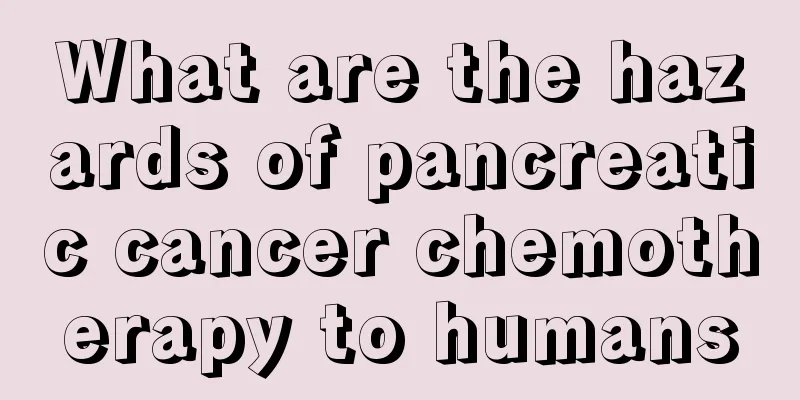What are the hazards of pancreatic cancer chemotherapy to humans

|
In addition to chemotherapy, radiotherapy is currently the most effective treatment for cancer. However, both radiotherapy and chemotherapy have certain side effects. After understanding these side effects, you can try to avoid and control them during treatment, alleviate the discomfort caused by chemotherapy, and improve the effectiveness of chemotherapy. 1. Decreased immune function: Chemotherapy drugs can damage the patient's immune system, leading to immune deficiency or decline. Immune function indicators such as E-roset test, CH50, C3 complement, T cell subsets, NK cell activity, interleukin II, etc., can all decrease to varying degrees after chemotherapy compared to before chemotherapy. Most anti-tumor chemotherapy drugs have immunosuppressive effects. 2. Physical weakness: Patients may experience general fatigue, mental depression, sweating, drowsiness, etc. 3. Bone marrow suppression: Most chemotherapy drugs can cause bone marrow suppression, which is manifested as a decrease in white blood cells and platelets, and even a decrease in red blood cells and hemoglobin. 4. Digestive disorders: decreased appetite, reduced food intake, nausea, vomiting, abdominal distension, abdominal pain, diarrhea or constipation, etc. Many chemotherapy drugs cause the above symptoms by irritating the gastrointestinal mucosa. 5. Inflammatory reaction: fever, dizziness, headache, dry mouth, mouth ulcers, etc. 6. Cardiotoxicity: Some chemotherapy drugs can cause cardiotoxicity and damage myocardial cells. Patients may experience symptoms such as palpitations, chest tightness, precordial discomfort, shortness of breath, and even heart failure. Electrocardiogram examinations may show T wave changes or ST segment changes. 7. Kidney toxicity: Large doses of some chemotherapy drugs can cause kidney damage and result in low back pain, discomfort in the kidney area, etc. 8. Pulmonary fibrosis: Cyclophosphamide, vincristine, bleomycin, etc. can cause pulmonary fibrosis. Chest X-rays show thickening or cord-like changes in lung texture. This is more dangerous for patients with poor lung function in the past, and can even be life-threatening. 9. Cystitis: Ifosfamide, cantharidin, camptothecin, etc. can cause patients to experience a series of drug-induced cystitis symptoms such as lower abdominal discomfort or bloating, hematuria, etc. 10. Nervous system toxicity: mainly refers to the damage of chemotherapy drugs to peripheral nerve endings. Patients may experience numbness and dysesthesia of the extremities. For example, vincristine, vinblastine, vinblastine, and novoben may cause neurotoxic side effects to varying degrees. 11. Phlebitis: Most chemotherapy drugs are administered by intravenous drip, which can cause varying degrees of phlebitis. The diseased blood vessels turn dark red or dark yellow, causing local pain and appearing like cords when touched. In severe cases, thrombotic phlebitis may occur, resulting in blood flow obstruction. |
<<: Complications of pancreatic cancer surgery
>>: Is it easy to recover from severe bleeding after pancreatic cancer surgery?
Recommend
Mosquitoes chasing and biting you is actually a dangerous signal
"Buzz buzz------" I'm here! My name...
Can long-term constipation lead to cervical cancer? Is it true that eating mushrooms can prevent cervical cancer?
One in six women suffers from cervical cancer, wh...
Is it good to eat pumpkin all the time?
Pumpkin is a very common dish in our life, it is ...
What are the chronic diseases that can be reimbursed under the New Rural Cooperative Medical Scheme?
The country's economic strength is growing, a...
Can the leaves of the southern candle be boiled and drunk? What are the effects?
As a common Chinese herbal medicine, some people ...
Does rock sugar cause internal heat?
Rock sugar is a very common thing in our lives. I...
At what level of skin cancer can one die
The onset of cancer has brought harm to many peop...
How to check lymphoma
Lymphoma, this disease has many different manifes...
What should I do if I don’t have a bowel movement after taking laxatives?
I believe many people are familiar with the disea...
About the cost of mid-to-late stage rectal cancer
How much does it cost to treat advanced colorecta...
What are the manifestations of cervical precancerous lesions? What are the causes of cervical precancerous lesions?
In the eyes of cervical cancer patients, there ar...
What are the dishes that are not suitable for people with cervical cancer? Dietary principles for cervical cancer
Patients with cervical cancer should avoid eating...
Small pimples on the skin caused by sun exposure
The appearance of small bumps on the skin due to ...
What are the symptoms of skin cancer
Symptoms of skin cancer vary depending on the typ...
Traditional Chinese Medicine Treatment for Endometrial Cancer
How does traditional Chinese medicine effectively...









